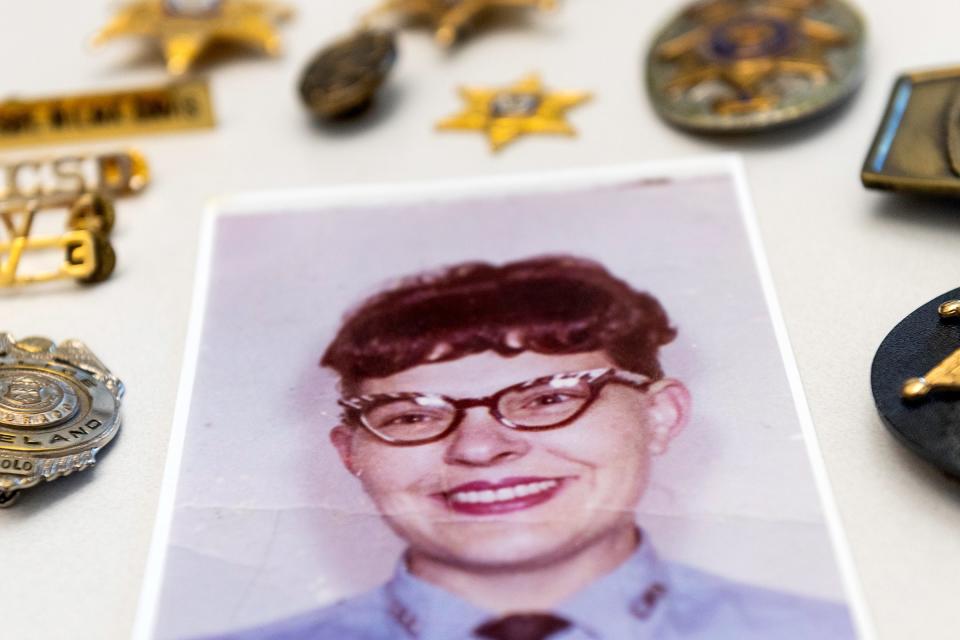'Thank you, Wilma': Larimer County Sheriff's Office, family honor legacy of first female deputy
One day in the mid-1970s — the records aren’t clear — Wilma J. Davis walked into the office of the Larimer County sheriff at the time, Jim Black, and told him that he should make her a deputy.
“She went to Sheriff Black one day and said, ‘I think you should make me a deputy because you don’t have any female deputies,’ ” Davis’ daughter Kay Persichitte said.
Not long after, Black agreed and sent Davis to law enforcement training.
“And we all went, 'What, really?' And off she went,” Persichitte said of the day her mother told them she was training to become a deputy.
That was the beginning of a successful 20-year career with the sheriff’s office for Davis, who became the first female deputy to work at the Larimer County Sheriff’s Office and retired as a sergeant.
But that was just one chapter of Davis’ life, which also included starting a business and raising a family in Loveland, pushing past stereotypes and finding success in male-dominated fields, Persichitte said.
Davis died Feb. 27 at age 89.
"Life's journey is not to arrive safely at the grave in a well preserved body, but rather to skid in sideways totally worn out, shouting Holy Moly, what a ride!!!" Davis wrote in her own obituary.

Prior to becoming a deputy, Davis ran a towing company with her husband of 43 years in Loveland and worked the overnight shift as a dispatcher for Loveland Police Department.
“She was proud of all the jobs she ever had,” Persichitte said.
The legacy left by Davis has helped other women in law enforcement — including Larimer County Sheriff’s Office Capt. Staci Shaffer — continue to achieve more than the generations before them.
“At a time when women were rare in law enforcement, she was a pioneer who paved the way for others,” the sheriff’s office said of Davis in a social media post.
‘A truly blessed life’: Who was Wilma Davis?
Growing up as the only girl with four brothers, Davis excelled in school and finished at the top of her class, entering nursing school at the young age of 16.
“She grew up in a very male-dominated world,” Persichitte said.
In her second year of nursing school, she met the love of her life, Leroy I. Davis, Sr. They eloped in 1952, and their marriage meant the end of Davis’ nursing career because nurses were required to be single in the early 1950s, Persichitte said.
The family moved to Loveland in the early 1960s, and Davis worked the overnight shift as a dispatcher for Loveland Police Department. A few years later, the family bought and started running an auto shop and gas station in Loveland, and Davis worked there while continuing to work the overnight dispatch shift, Persichitte said.
By 1970, the family wasn’t making money off of the gas station, Persichitte said, so her father built a tow truck from scratch and the couple started the first towing business in Loveland, Leroy’s Wrecking Service, and Davis became the only female tow truck driver in town.
“She worked in a lot of areas that were not women's kinds of jobs,” Persichitte said. “So, I grew up thinking you can decide what you want to do and go get it and make it happen.”
Davis quit the dispatch center a few years later to help run the towing business full time, Persichitte said. A few years later, when Persichitte’s brothers turned 16 and were able to help with the family business, Persichitte said her mother stopped doing full-time work there and started looking for her next career move.
“She had always been quite a baker. She made mouthwatering cinnamon rolls, and her homemade bread was just unbelievable,” Persichitte said. “She apparently saw an ad that they needed a cook at the Larimer County Sheriff’s Office (in the jail)."
The family was very familiar with law enforcement in the area from Davis’ work at the dispatch center as well as the family’s towing company, so working at the jail just made sense, Persichitte said. After working in the jail’s kitchen for a while, Persichitte said she decided she could contribute more to the sheriff’s office and asked Black to make her a deputy.
“When she made up her mind to do something, it got done,” Persichitte said.
Davis never complained about working at the sheriff’s office and “was always so proud of her work there,” Persichitte said.
“She just said it was hard, but you just had to stand up for yourself and work hard,” Persichitte said.
She continued working for the family towing company while at the sheriff’s office, which often meant her coming home and changing out of her uniform into her towing work clothes and heading to the shop, Persichitte said.
“It was 24/7.”
Davis retired from the sheriff’s office after injuring herself on the job after 20 years of service, Persichitte said, but that didn’t mean she slowed down. She continued various community service activities in the community and remained involved in the local Elks Club and Lions Club.
“I just hope people remember her as a gal who cared about other people and who in everything she ever did, she did her best to be the best at it, everything she tried,” Persichitte said.
“I have had a truly blessed life,” Davis wrote in her obituary.
'Thank you, Wilma’
Davis’ legacy has continued to inspire new generations of female law enforcement officers and others who don’t conform to the stereotype of what a typical law enforcement officer is, Shaffer said.
“It was at this time that females had to work twice as hard to get half as far. It doesn't work that way today,” Davis wrote in her obituary.

When Shaffer started at the sheriff’s office in 1995, she said, there were “still a bit of stereotypes" for women in law enforcement despite a few other women holding leadership roles in the department at the time.
“As a female, I show up early, I stay later, I work the extra shifts,” Shaffer said. “I want to work hard because I don’t want anyone to think I just got the job because I am female or to fill a box.”
Back when she started, Shaffer said she remembers hearing things like departments not needing to hire another woman because they already had one, but she never “wanted to fill a quota, I want to be important and create value.”
In a look around Shaffer’s office, it’s clear by the plaques and certificates on the wall that she’s had an impact. In addition to her various degrees and certifications, Shaffer won Larimer County’s Judge Conrad L. Ball Award in 2022 in recognition of her work improving public safety in the county, including bringing the medication-assisted treatment program to the Larimer County Jail to help those who are experiencing substance use disorder.
Shaffer said she considers jail a “stopportunity” for those who “are ready to make a change” in their lives.
“I want folks to feel like when they leave, they have a network of resources to make a change,” she said.
More: How Stone Soup supports people leaving Larimer County Jail
Shaffer said she puts up her certificates and degrees “not to make people feel uncomfortable about my education, but because I want them to understand when they come into this office that I’ve earned it.”
Another certification on display is for her work with the jail’s special response team, of which Shaffer was the sole female member. It’s a challenging role that requires restraining individuals who are trying to hurt themselves or others, Shaffer said.
In that role, Shaffer said, she focused on doing her job well — even if "I got bloody noses or black eyes or whatever."
Being a woman in law enforcement, Shaffer said it's important to her to be her authentic self. On days she’s not required to be in full uniform, she said she wears skirt suits with her firearm on her hip to show other women in the field they don't have to conform to masculine stereotypes.
“You could certainly be tough, you could certainly have that attitude, but there’s also room to be more feminine and room to show strength in patience, in conversation,” Shaffer said.
Shaffer said her next goal is to bring in the new generation of women and those who are transgender into law enforcement, something she said is ongoing work with the sheriff’s office’s internship program she oversees.
“Honoring the women who have gone before is important because I didn’t have to do that,” Shaffer said. “So, thank you, Wilma, for making sure that I didn’t have to be the first sergeant or the first leader. There was room for people to see women in this role.”
This article originally appeared on Fort Collins Coloradoan: The legacy of Larimer County Sheriff's Office's first female deputy

